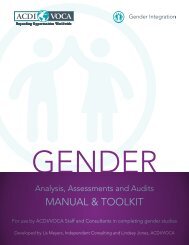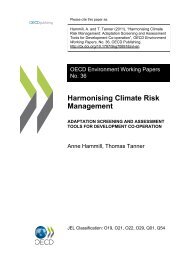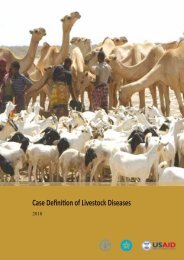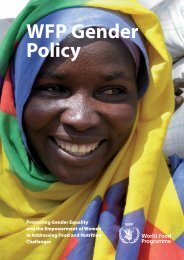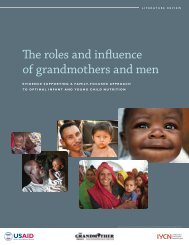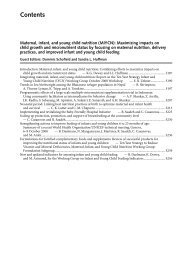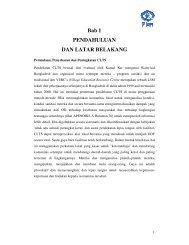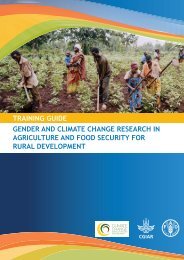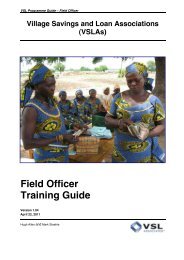Module 2. Theorethical Concepts of Gender - FSN Network Portal
Module 2. Theorethical Concepts of Gender - FSN Network Portal
Module 2. Theorethical Concepts of Gender - FSN Network Portal
Create successful ePaper yourself
Turn your PDF publications into a flip-book with our unique Google optimized e-Paper software.
Mainstreaming <strong>Gender</strong> into Water, Sanitation and Hygiene (WASH) Programs<br />
<strong>Module</strong> 2: Theoretical <strong>Concepts</strong> <strong>of</strong> <strong>Gender</strong><br />
Lesson 6: <strong>Gender</strong> <strong>Concepts</strong> (1): Sex, <strong>Gender</strong> and <strong>Gender</strong> Mainstreaming<br />
Insights into <strong>Gender</strong> and Development<br />
Women and Men in Development<br />
Handout 6.1.3<br />
There has been a tendency to regard issues <strong>of</strong> gender and equality in<br />
development as being a ‘women’s concern’ in which initiatives are largely<br />
pursued by and for women. With experience and the more widespread<br />
adoption <strong>of</strong> the concept <strong>of</strong> ‘gender’, there has been greater recognition <strong>of</strong> the<br />
need to consider men and their gender identities, and to involve men in the<br />
pursuit <strong>of</strong> change. That is why the emphasis is now on gender and<br />
development and the importance <strong>of</strong> men in relation to strategies to reach<br />
gender equality, sometimes called a masculinity approach.<br />
Some people have questioned the focus on women and development saying<br />
that if the concern is ‘gender’, should not equal attention be paid to women<br />
and men? This is the reason why gender has been identified as an issue for<br />
development cooperation – the inequalities between women and men that<br />
result in women having less access to development resources and decisionmaking<br />
power at all levels <strong>of</strong> society. There is a need also to consider the<br />
development needs <strong>of</strong> men as they take their part in facilitating development.<br />
<strong>Gender</strong> equality strategies exist to promote attention to the development<br />
needs <strong>of</strong> both women and men, especially those that have largely been<br />
invisible, and to address the processes that continue to structure an unequal<br />
distribution <strong>of</strong> resources and opportunities to the disadvantage <strong>of</strong> women.<br />
A focus on women in isolation from their relationships with men can<br />
undermine strategies to achieve various development objectives, including the<br />
objective <strong>of</strong> reducing disparities between women and men. A gender analysis<br />
must consider not only differences between women and men, but inequalities<br />
in the relationship between them and what this means for the possibilities and<br />
actions <strong>of</strong> different groups <strong>of</strong> women and men. For example, inequalities<br />
between women and men, and unequal relations between them, influence<br />
decision-making about fertility and sexuality. Thus male gender identities and<br />
behaviour must be taken into account in order to develop effective strategies<br />
in population control.<br />
?The gender identities <strong>of</strong> women and men are closely interlinked. One way this<br />
is evident is in the division <strong>of</strong> labour by gender. Certain tasks and<br />
responsibilities are seen as appropriate for women and others for men – the<br />
division <strong>of</strong> labour itself creates interdependence. Changes for women thus<br />
also mean changes for men. More broadly, equality between women and men<br />
cannot be achieved only by changes in the roles and responsibilities carried<br />
by women. To date, men have not generally been involved in considering<br />
what a more equal society would look like and in working as partners with<br />
women to define and pursue strategies for equality. In part, this can reflect<br />
resistance to the implications <strong>of</strong> change. However, it can also be argued that<br />
A Training Manual for Water Pr<strong>of</strong>essionals developed collaboratively by PROTOS and SNV, 01/02/2007<br />
<strong>2.</strong>21



